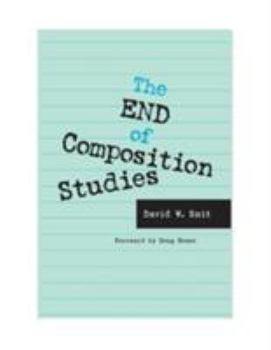The End of Composition Studies
Select Format
Select Condition 
Book Overview
In this provocative and persuasive treatise, David W. Smit calls for an end to the hegemony of writing instruction as an academic field. Setting forth an innovative new model for what it means to be a writing teacher in the era of writing across the curriculum, The End of Composition Studies urges a reconceptualization of graduate work in rhetoric and composition, systematically critiques the limitations of current pedagogical practices at the postsecondary level, and proposes a reorganization of writing instruction to make it the responsibility of all academic units. The End of Composition Studies calls into question two major assumptions of the field: that writing is a universal ability and that college-level writing is in some sense foundational to advanced learning. Instead, Smit upholds, writing involves a wide range of knowledge and skill beyond the sentence level that cannot be solely learned in writing classes but must be acquired by immersion in various discourse communities in and out of academic settings. In other words, students do not learn to write in order to prepare themselves to write in a particular community; they need to be part of the community in order to learn how to write in that community. Smit proposes that the field of composition should recognize the conceptual limits of what instructors may be able to know about how people learn to write by offering writing instruction in academic units most closely associated with the knowledge and genres students want or need to learn. Scholars, he says, should be trained to live in two worlds: one of composition theory and pedagogy and another of the discourse practices of particular communities. Similarly, they should be trained both as writers of the discourses they teach and as social critics of the communities they will help students join. The End of Composition Studies also analyzes the limits of six major concepts in the field: what writing is, how writing is learned, how we compose, writing as a social practice, writing as thinking, and writing as the transfer of abilities from one context to another. These concepts, along with other paradigms and models that are used to understand how people write, are already known and widely accepted, making a complete reconceptualization of writing unlikely. As a result, Smit asserts, future research in the field will be what many scholars characterize as postmodern: research will be historicized, contextualized, and contingent, limited in what it may tell about writing and its instruction. In response to these limitations, The End of Composition Studies provides a compelling rhetoric and rationale for eliminating the field and reenvisioning the profession as truly interdisciplinary--a change that is necessary in order to fulfill the needs and demands of students, instructors, administrators, and our democratic society.
Format:Hardcover
Language:English
ISBN:0809325853
ISBN13:9780809325856
Release Date:December 2004
Publisher:Southern Illinois University Press
Length:272 Pages
Weight:1.15 lbs.
Dimensions:9.0" x 0.9" x 6.0"
Related Subjects
Administration College & University Creative Writing & Composition Education Education & Reference Education Theory Higher & Continuing Education Instruction Methods Language Arts Literature Literature & Fiction Reference Rhetoric Schools & Teaching Study & Teaching Words, Language & Grammar Writing Writing, Research & Publishing GuidesCustomer Reviews
0 rating





